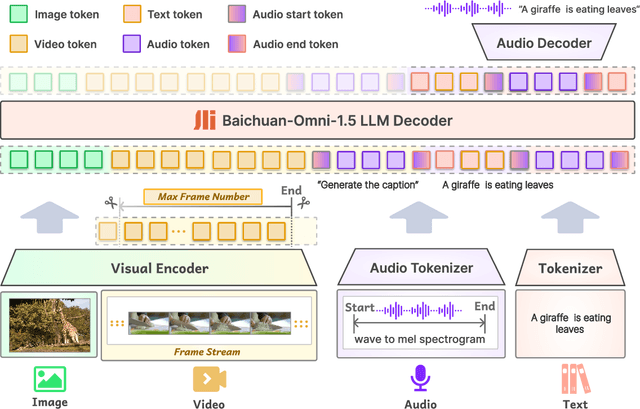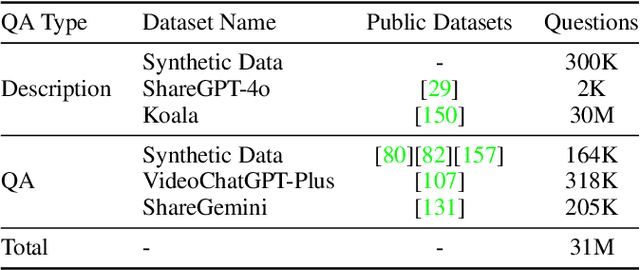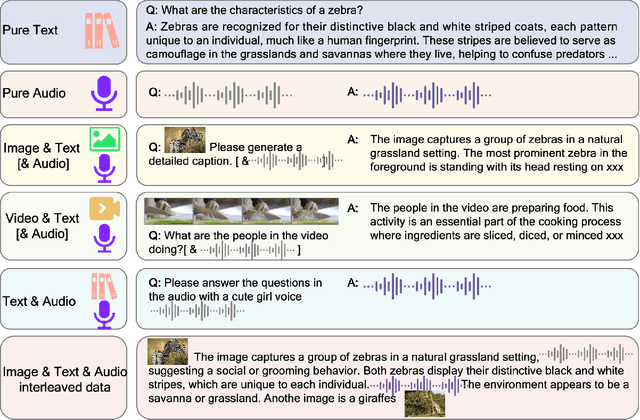Yicong Chen
AVMeme Exam: A Multimodal Multilingual Multicultural Benchmark for LLMs' Contextual and Cultural Knowledge and Thinking
Jan 25, 2026Abstract:Internet audio-visual clips convey meaning through time-varying sound and motion, which extend beyond what text alone can represent. To examine whether AI models can understand such signals in human cultural contexts, we introduce AVMeme Exam, a human-curated benchmark of over one thousand iconic Internet sounds and videos spanning speech, songs, music, and sound effects. Each meme is paired with a unique Q&A assessing levels of understanding from surface content to context and emotion to usage and world knowledge, along with metadata such as original year, transcript, summary, and sensitivity. We systematically evaluate state-of-the-art multimodal large language models (MLLMs) alongside human participants using this benchmark. Our results reveal a consistent limitation: current models perform poorly on textless music and sound effects, and struggle to think in context and in culture compared to surface content. These findings highlight a key gap in human-aligned multimodal intelligence and call for models that can perceive contextually and culturally beyond the surface of what they hear and see. Project page: avmemeexam.github.io/public
Baichuan-Omni-1.5 Technical Report
Jan 26, 2025



Abstract:We introduce Baichuan-Omni-1.5, an omni-modal model that not only has omni-modal understanding capabilities but also provides end-to-end audio generation capabilities. To achieve fluent and high-quality interaction across modalities without compromising the capabilities of any modality, we prioritized optimizing three key aspects. First, we establish a comprehensive data cleaning and synthesis pipeline for multimodal data, obtaining about 500B high-quality data (text, audio, and vision). Second, an audio-tokenizer (Baichuan-Audio-Tokenizer) has been designed to capture both semantic and acoustic information from audio, enabling seamless integration and enhanced compatibility with MLLM. Lastly, we designed a multi-stage training strategy that progressively integrates multimodal alignment and multitask fine-tuning, ensuring effective synergy across all modalities. Baichuan-Omni-1.5 leads contemporary models (including GPT4o-mini and MiniCPM-o 2.6) in terms of comprehensive omni-modal capabilities. Notably, it achieves results comparable to leading models such as Qwen2-VL-72B across various multimodal medical benchmarks.
Buffer-based Gradient Projection for Continual Federated Learning
Sep 03, 2024Abstract:Continual Federated Learning (CFL) is essential for enabling real-world applications where multiple decentralized clients adaptively learn from continuous data streams. A significant challenge in CFL is mitigating catastrophic forgetting, where models lose previously acquired knowledge when learning new information. Existing approaches often face difficulties due to the constraints of device storage capacities and the heterogeneous nature of data distributions among clients. While some CFL algorithms have addressed these challenges, they frequently rely on unrealistic assumptions about the availability of task boundaries (i.e., knowing when new tasks begin). To address these limitations, we introduce Fed-A-GEM, a federated adaptation of the A-GEM method (Chaudhry et al., 2019), which employs a buffer-based gradient projection approach. Fed-A-GEM alleviates catastrophic forgetting by leveraging local buffer samples and aggregated buffer gradients, thus preserving knowledge across multiple clients. Our method is combined with existing CFL techniques, enhancing their performance in the CFL context. Our experiments on standard benchmarks show consistent performance improvements across diverse scenarios. For example, in a task-incremental learning scenario using the CIFAR-100 dataset, our method can increase the accuracy by up to 27%. Our code is available at https://github.com/shenghongdai/Fed-A-GEM.
MathScape: Evaluating MLLMs in multimodal Math Scenarios through a Hierarchical Benchmark
Aug 15, 2024Abstract:With the development of Multimodal Large Language Models (MLLMs), the evaluation of multimodal models in the context of mathematical problems has become a valuable research field. Multimodal visual-textual mathematical reasoning serves as a critical indicator for evaluating the comprehension and complex multi-step quantitative reasoning abilities of MLLMs. However, previous multimodal math benchmarks have not sufficiently integrated visual and textual information. To address this gap, we proposed MathScape, a new benchmark that emphasizes the understanding and application of combined visual and textual information. MathScape is designed to evaluate photo-based math problem scenarios, assessing the theoretical understanding and application ability of MLLMs through a categorical hierarchical approach. We conduct a multi-dimensional evaluation on 11 advanced MLLMs, revealing that our benchmark is challenging even for the most sophisticated models. By analyzing the evaluation results, we identify the limitations of MLLMs, offering valuable insights for enhancing model performance.
Can MLLMs Perform Text-to-Image In-Context Learning?
Feb 02, 2024



Abstract:The evolution from Large Language Models (LLMs) to Multimodal Large Language Models (MLLMs) has spurred research into extending In-Context Learning (ICL) to its multimodal counterpart. Existing such studies have primarily concentrated on image-to-text ICL. However, the Text-to-Image ICL (T2I-ICL), with its unique characteristics and potential applications, remains underexplored. To address this gap, we formally define the task of T2I-ICL and present CoBSAT, the first T2I-ICL benchmark dataset, encompassing ten tasks. Utilizing our dataset to benchmark six state-of-the-art MLLMs, we uncover considerable difficulties MLLMs encounter in solving T2I-ICL. We identify the primary challenges as the inherent complexity of multimodality and image generation. To overcome these challenges, we explore strategies like fine-tuning and Chain-of-Thought prompting, demonstrating notable improvements. Our code and dataset are available at \url{https://github.com/UW-Madison-Lee-Lab/CoBSAT}.
 Add to Chrome
Add to Chrome Add to Firefox
Add to Firefox Add to Edge
Add to Edge